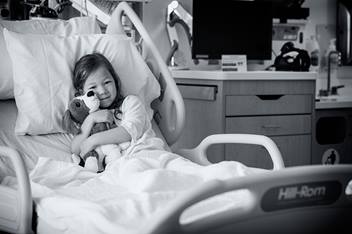Critical Care Fellowship Training and Experience
| First Year | Number of Months |
| Orientation | 1 |
| PICU | 5 |
| Cardiothoracic ICU | 1 |
| Anesthesia | 1 |
| Sedation/Transport | 1 |
| Research | 3 |
| Second Year | Number of Months |
| PICU | 4 |
| Cardiothoracic ICU | 2 |
| Research | 6 |
| Third Year | Number of Months |
| PICU | 3 |
| Cardiothoracic ICU | 1 |
| Elective | 2 |
| Research | 6 |
Clinical Training
During clinical service months in the PICU, fellows are expected to provide hands-on patient care, as well as supervise and direct patient care provided by residents. By the end of the first year of training, the fellow will have gained experience in the recognition, triage, and management of a wide variety of acute illnesses, and will have gained skill in the performance of invasive procedures. Though the second and third years are skewed toward research time, Clinical time during the second and third years will be dedicated to the honing of clinical skills with emphasis on plan-making and team leadership.
The beginning of the first year includes a comprehensive orientation program, a unique week-long hands-on course in extracorporeal membrane oxygenation (ECMO) support, and participation in a national “boot camp” with simulation and team-building exercises to facilitate a smooth transition into fellowship.
Fellows will provide overnight ICU coverage during the PICU and Anesthesia rotations. Coverage responsibilities will not exceed an average of every fourth night during these rotations.
In addition to months of service in the PICU, three other clinical rotations serve to round out the PCCM fellow’s clinical education:
- In the first year, fellows will have one month that is a combination of Transport Medicine (two weeks), and Procedural Sedation education and training (two weeks). During Transport shifts fellows will spend time with the hospital’s Transport team, participating in both ground and air transport of critically ill patients. During sedation shifts fellows will learn to perform procedural sedation both in the PICU and with Anesthesia in the Nationwide Children’s Procedure Center. both within and outside of the PICU.
- In the first year, one month is spent on the Anesthesia service, gaining experience with airway management and vascular access in the operating room.
- A total of four months will be spent on the Cardiothoracic ICU service during the three-year fellowship. Cardiothoracic Intensive Care: The Cardiothoracic ICU rotation is designed to allow the fellow to have a focused experience in the management of critically ill medical and surgical cardiac patients and thoracic surgery patients, including children with heart and/or lung transplantation. The fellow will work closely with our cardiac intensivists and attend focused didactic sessions offered by the Division of Cardiology. In-house call consists of coverage of ONLY the children in the Cardiothoracic intensive care unit. The CTICU is a 20-bed unit that cares for approximately 80% surgical patients and 20% cardiac medical patients. The management is a team approach coordinated by a cardiac intensivist with collaboration from cardiothoracic surgeons and subspecialty cardiologists as needed. An average of 430 cardiothoracic surgeries are performed yearly, including an average of 260 annual open-heart operations.
Cardiothoracic Intensive Care: The Cardiothoracic ICU rotation is designed to allow the fellow to have a focused experience in the management of critically ill medical and surgical cardiac patients and thoracic surgery patients, including children with heart and/or lung transplantation. The fellow will work closely with our cardiac intensivists and attend focused didactic sessions offered by the Division of Cardiology. In-house call consists of coverage of ONLY the children in the Cardiothoracic intensive care unit.
- The CTICU is a 20-bed unit that cares for approximately 80% surgical patients and 20% cardiac medical patients. The management is a team approach coordinated by a cardiac intensivist with collaboration from cardiothoracic surgeons and subspecialty cardiologists as needed. An average of 430 cardiothoracic surgeries are performed yearly, including an average of 260 annual open-heart operations.
Fellows are exposed to Point of Care Ultrasound throughout their fellowship.
- There is an annual POCUS bootcamp with Anesthesia and PEM fellows that includes didactic and hands on practice using live pediatric and young adult models to learn the role of Point of Care Ultrasound in procedures as well as in assessment of the heart, lungs and abdomen. A longitudinal PICU specific curriculum includes didactic lectures and hands on practice throughout the fellowship.
Electives: Fellows in their third year have two months of flexible Elective time that can be tailored to individual fellows’ needs as they progress toward junior faculty positions. These can be spent clinically, or as additional research months as circumstances dictate.
Important PCCM Fellow Research Experience Aspects
Important aspects of the PCCM fellows’ research experience at Nationwide Children's Hospital include:
- The majority of Many research months are call-free.
- First year trainees will receive an orientation to the Abigail Wexner Research Institute and The Ohio State University academic communities including tours of relevant facilities and an overview of the ongoing research in each Center.
- We offer a comprehensive and highly structured mentor matching program, insuring ensuring that fellows are aware of (and take full advantage of) the diverse academic opportunities at Nationwide Children's Hospital.
- PCCM fellows have regular Scholarship Oversight Committees, with representation from senior clinical and basic scientists, providing research and career development guidance to augment that provided by individual research mentors.
- The AWRI at Nationwide Children's Hospital offers an Institute-wide didactic research curriculum tailored specifically to clinical fellows. This series teaches subjects related to research methodologies, principles of biostatistics, grantsmanship, and academic career development.
- PCCM fellows with an interest in developing a research-intensive career will be offered advanced training in scientific study design and execution, scientific communication and grantsmanship skills in their second and third years of fellowship as part of an Advanced Research Competency Curriculum tailored to individual fellows’ academic area(s) of interest.
PCCM fellows will have the following academic goals during their fellowships:
- First year: Selection of an area of interest; matching with an appropriate mentor; development of a hypothesis and research plan.
- Second year: Research plan implementation with collection of data and preliminary data analyses; may include presentation of early findings at a minimum of one national meeting.
- Third year: Completion of data collection and analyses; preparation of manuscript(s) for publication; presentation of findings at a minimum of two national meetings. We expect the Pediatric Critical Care Medicine subspecialty trainees to become fully integrated into the research program of their chosen mentor and will have appropriate resources made available to them. Trainees will not be responsible for securing their own research funding. Competitive intramural seed grant funding is available, however, for trainees who wish to augment their research projects and gain experience with the grant writing process.
Master’s Degrees: A variety of Master’s-level degree programs including Master’s of Public Health and Master’s of Clinical Research are available through The Ohio State University. Fellows are eligible to apply for competitive funding awards.



